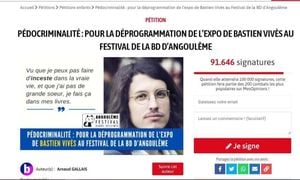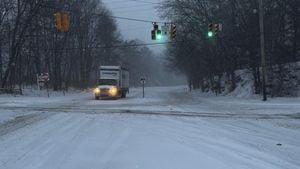A car drove intentionally or accidentally through a crowd of demonstrators during a Verdi union rally in Munich on Thursday, resulting in injuries to at least 28 people. The incident occurred around 10:30 AM on Dachauer Street, where approximately 2,500 union members had gathered to protest for higher wages and improved working conditions.
The driver, identified as 24-year-old Afghan asylum seeker Farhad N., was detained by authorities shortly after the crash. Reports indicate he had prior police encounters related to drug offenses and shoplifting, raising questions about his status as an asylum seeker. According to police statements, the incident is viewed as potentially intentional. Bavarian state premier Markus Söder characterized it as a "suspected attack," emphasizing the necessity for changes to the country's immigration policies.
Eyewitness accounts suggest the car accelerated past police vehicles and plowed directly toward the demonstrators. One witness described hearing engines rev before chaos ensued with people screaming and fleeing. Images from the scene depicted emergency workers tending to injured individuals, including children, as rescue helicopters airlifted some of the more critically hurt to local hospitals. Among the victims, two people were reported to have severe injuries, with at least one child potentially facing life-threatening conditions.
The demonstration had been organized by Verdi, one of Germany’s largest unions, representing public sector workers who had walked off the job to demand substantial wage increases. Verdi leaders expressed their shock and sorrow over the incident, urging solidarity with victims and their families. "We are deeply shocked and our hearts are with the innocent victims and those injured," stated the union.
Political leaders were quick to respond to the tragedy. Chancellor Olaf Scholz, speaking at a campaign stop, referred to the event as "a terrible attack" and stressed the need for immediate legal repercussions for the driver. He voiced the necessity to expedite deportation procedures for individuals who pose security threats to the public. Scholz's remarks come at a politically charged time, as EU immigration policies remain contentious field with varying opinions among voters.
The timing of the incident, occurring just days before Germany's general elections, stirred discussions on immigration policies and security, re-energizing the far-right Alternative for Germany (AfD) party’s calls for stricter immigration controls. The incident, coupled with rising violence attributed to male asylum seekers, has put considerable pressure on the ruling government to enact significant reform to current immigration practices.
Authorities are actively investigating the motives behind the attack and are exploring any connections to radical ideologies, particularly as evidence emerges of the driver's social media activity prior to the incident, which included posts speculated to reflect Islamic extremist viewpoints. Interior Minister Joachim Herrmann noted, "We are currently treating this with utmost seriousness and focusing on all possible aspects of the investigation to determine the real intent behind this horrific act."
The Munich crash also raised alarm as it coincided with preparations for the Munich Security Conference, which draws global leaders and security experts to address international conflicts and security challenges. Fortunately, police indicated they have found no links between the conference and the incident.
With investigations still underway, police have encouraged any witnesses to the demonstration or the crash to come forward and provide relevant videos or information. They have established collection points within local establishments to facilitate this.
The broader societal impact of this incident is still unraveling, as it has reignited debates about community safety, integration for asylum seekers, and overall public security. The incident is being closely monitored as upcoming election rallies may become hotspots for political discourse concerning immigration and public safety.
Germany has seen its share of terror-related incidents over the past years, leading to increased scrutiny of migrant communities and calls for revised immigration policies. Many hope this tragic event can be addressed without resulting in heightened hostility against all asylum seekers, stressing the need for nuanced and fair immigration reforms.
Community leaders and activists have urged for calm, emphasizing dialogue and cooperation as the country grapples with conflicting emotions surrounding safety and solidarity with the victims. After the rally was disrupted, participants expressed their fear and confusion surrounding the events. Survivors of such incidents often carry the psychological burden long after physical wounds have healed, leaving communities to grapple with the aftereffects of violence.
Police remain vigilant, increasing their presence around public events as security becomes more of an issue of public sentiment — especially during such impactful times as elections and significant global gatherings. The tragic fallout from the Munich incident will likely shape future discussions on security and immigration within the German political arena, as leaders confront both the moral and practical aspects of governing amid rising tensions.



